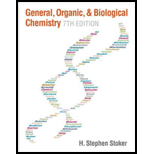
Concept explainers
(a)
Interpretation:
The organic compound that is formed when the given molecule is decarboxylated has to be drawn.
Concept Introduction:
The carboxylate ions play key roles in many reactions that occur within human body. Generally the carboxyl functional group is not reduced or oxidized. Apart from oxidation and reduction, the

(b)
Interpretation:
The organic compound that is formed when the given molecule is decarboxylated has to be drawn.
Concept Introduction:
The carboxylate ions play key roles in many reactions that occur within human body. Generally the carboxyl functional group is not reduced or oxidized. Apart from oxidation and reduction, the carboxylic acid undergoes decarboxylation reaction. In this reaction the carboxylic acid gets converted to smaller organic molecule and a molecule of carbon dioxide. The general reaction scheme for this reaction can be given as shown below,

Want to see the full answer?
Check out a sample textbook solution
Chapter 16 Solutions
General, Organic, and Biological Chemistry
 Organic And Biological ChemistryChemistryISBN:9781305081079Author:STOKER, H. Stephen (howard Stephen)Publisher:Cengage Learning,
Organic And Biological ChemistryChemistryISBN:9781305081079Author:STOKER, H. Stephen (howard Stephen)Publisher:Cengage Learning, General, Organic, and Biological ChemistryChemistryISBN:9781285853918Author:H. Stephen StokerPublisher:Cengage Learning
General, Organic, and Biological ChemistryChemistryISBN:9781285853918Author:H. Stephen StokerPublisher:Cengage Learning

